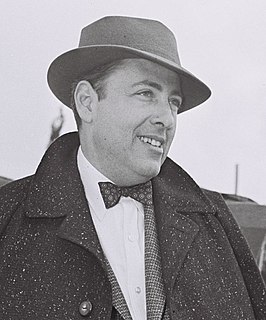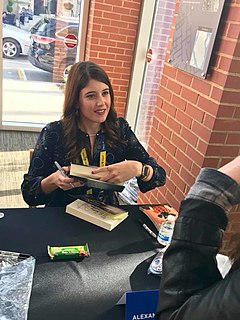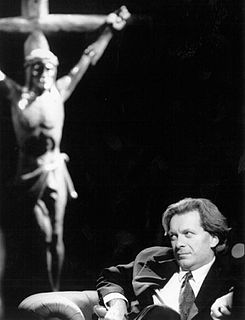A Quote by Margaret Atwood
The newspaper stories were like dreams to us, bad dreams dreamt by others. How awful, we would say, and they were, but they were awful without being believable. They were too melodramatic, they had a dimension that was not the dimension of our lives. We were the people who were not in the papers. We lived in the blank white spaces at the edges of print. It gave us more freedom. We lived in the gaps between the stories.
Related Quotes
Let us fill a cup and drink to that most noble, ridiculous, laughable, sublime figure in our lives... The Young Man Who Was. Let us drink to his dreams, for they were rainbow-colored; to his appetites, for they were strong; to his blunders, for they were huge; to his pains for they were sharp; to his time for it was brief; and to his end, for it was to become one of us.
Israel is imperfect, of course it is - a far cry from the monumental dreams of the founding fathers. One of the reasons is that their dreams were unrealistic. They were bigger than life. These were messianic dreams, dreams about total redemption for the Jews, for the world. Such dreams do not come true, not in their entirety.
It's always intrigued me that amidst the group called slaves there were individuals who were extremely able, who were extremely colorful, who were powerful personalities, who by no means fit the usual images of slaves. They were people who, through their personalities and abilities, were very respected in the community where they lived by both black and white.
Who knew what evil lurked in the hearts of men? A copper, that's who. (...)You saw how close men lived to the beast. You realized that people like Carcer were not mad. They were incredibily sane. They were simply men without a shield. They'd looked at the world and realized that all the rules didn't have to apply to them, not if they didn't want them to. They weren't fooled by all the little stories. They shook hands with the beast.
We were together because we were addicted to each other. I was never as intoxicated as I was when we were happy together, and I knew it was the same for him. We were putting ourselves through the wringer for those moments of perfection between us, but they were so tenuous that only our stubbornness, determination and love kept us fighting for them.
'Hoop Dreams' brought us back to our roots in veríté filmmaking. What we saw in the powerful emotional scenes within it - at nearly three hours long and with no star power - was an outreach to a different and more important audiences. There were the similarly involved folks who saw it that were part of the struggle, but there was also a new audience that weren't empathetic or sympathetic to the people we were portraying. They would never watch a film about inner city families, but they watched 'Hoop Dreams.'
I remember the moment in which we were taken hostage in Libya, and we were asked to lie face down on the ground, and they started putting our arms behind our backs and started tying us up. And we were each begging for our lives because they were deciding whether to execute us, and they had guns to our heads.
Israel is a fulfillment, and as a fulfillment, it is flawed. Dreams fulfilled are imperfect. And, Israel is imperfect, of course it is - a far cry from the monumental dreams of the founding fathers. One of the reasons is that their dreams were unrealistic. They were bigger than life. These were messianic dreams, dreams about total redemption for the Jews, for the world. Such dreams do not come true, not in their entirety.




































